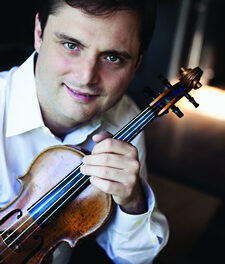On September 23, the experience of having performed their tour program twice at home was evident in the confidence and considerable polish of the Greensboro Symphony Orchestra’s playing. The occasion was their second out-of-town jaunt to McCrary Theatre on the campus of Elon University. A large, enthusiastic and attentive audience nearly filled the very comfortable hall. The pleasure of the afternoon concert was somewhat lessened by the breaking story that this would be the last full season of the GSO under the direction of Stuart Malina, one of the region’s most effective and imaginative music directors. He will conduct the opening and closing concerts of the 2002-3 season and continue his artistic and administrative duties while the search process for his successor is undertaken. He will retain his directorship of his other orchestra, the Harrisburg Symphony, in Pennsylvania. Malina plans to pursue other career opportunities abroad and around the country, particularly in New York. He began his opera conducting last fall with a fine Piedmont Opera Theatre production of Massenet’s Manon. The performance of Richard Strauss’ orchestral showpiece Don Juan had plenty of sweep and considerable finesse. Multiple concerts had tightened the ensemble and doubtless made for more assured entries. The string choir had a fine sheen. Unlike last year’s concert, which seemed too loud, Malina adjusted the dynamics carefully for McCrary’s smaller space. The results sounded better than at their usual venue, Greensboro’s War Memorial Auditorium, one of our region’s typically uneven halls. String versus brass balances were excellent. Concertmaster John Fadial’s solos were sweet toned and eloquently expressive. The slow, gentle solo of Principal Oboist Cara Fish was outstanding; hers was a fresh and memorable interpretation. Also marvelous was the sound of the horn choir set against the dark tapestry of the contrabassoon and the low strings. Principal Clarinetist Kelly Burke’s solos were up to her usual high standard.
Next came a lively performance of the four-movement Divertimento formed from music for Igor Stravinsky’s ballet Le Baiser de la Fée (The Fairy’s Kiss). In this work, Stravinsky pays loving tribute to Tchaikovsky by using music from his less well-known piano music and songs. The climax uses Tchaikovsky’s most famous song, a setting of a Russian translation of Goethe’s “Nur wer die Sehnsucht kennt” that is usually rendered in English as “None but the Lonely Heart.” The woodwinds were excellent in the piquant sinfonia, as was the delicate playing of the string choir. The solo contributions of Principal Flutist Debra Reuter-Privetta were outstanding. The pungent horns and trombones were a delight. There was a delectable episode for the trombone and timpani. Principal Cellist Beth Vanderborgh’s burnished sound glowed in her extensive solos. Striking solos were also contributed by Burke and harpist Helen Rifa.
Tchaikovsky’s Symphony No. 5 in E Minor, Op. 64, received a good, standard interpretation that allowed the music to sound fresh throughout. Overall, the balance was nearly ideal in all four movements. The low strings had a good deep rich sound. The second movement, Andante cantabile, was outstanding in every way, resulting in one of the finest performances that I have ever heard live. The crucial solo of Principal Horn Robert Campbell had a not inappropriate touch of vibrato and was assured and eloquent. All the woodwinds were accomplished in the third movement, as were the scampering violins that accompanied them. The brass were brazen and secure in the rousing finale. My only reservation was that Malina may not have given full value to the pause near the end, the one that all too often allows a rush of premature applause from audiences. In this instance, the music never came to a stop, but this is a minor criticism for a performance with so much that was right. Because of the tragedy of September 11, the concert opened with a moment of silence followed by the National Anthem. The afternoon ended with an involved performance of “God Bless America.”












